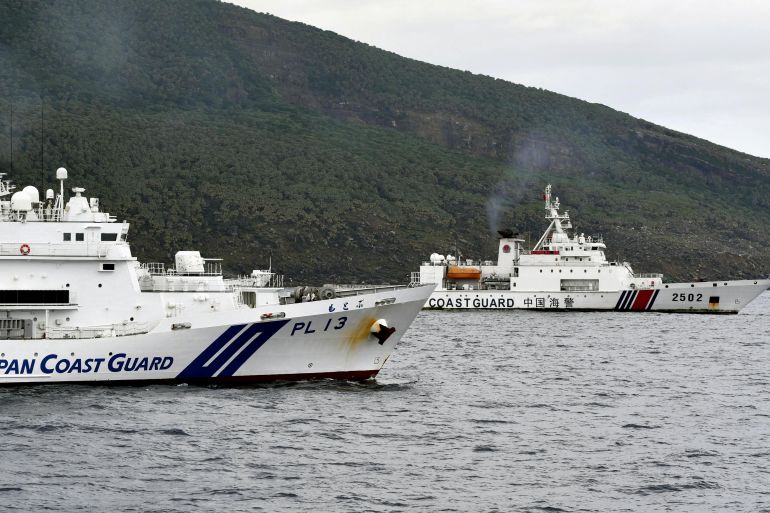China accuses Japanese vessel of ‘illegally’ entering disputed waters
The incident is the latest between China and Japan around disputed islands in the East China Sea.
A China coastguard vessel sails near a Japan coastguard vessel off one of the disputed islands that form what are known as the Senkaku Islands in Japan and the Diaoyu Islands in China, in April 2024 [Kyodo via Reuters]Published On 17 Oct 202417 Oct 2024
China’s coastguard said it ordered a Japanese fishing vessel to leave the country’s territorial waters after it “illegally” entered an area surrounding a disputed group of islands in the East China Sea.
A spokesperson for Beijing’s coastguard said on Thursday it “took necessary control measures in accordance with the law, warned [the ship] and expelled it” during the incursion into waters around the Diaoyu Islands – which Tokyo calls the Senkaku Islands – on October 15-16.
“We urge the Japanese side to immediately stop all illegal activities in these waters,” spokesperson Liu Dejun said in a statement.
Japan has yet to comment on this latest incident near the disputed islands.
Tokyo rejects China’s claim over the tiny, uninhabited islands in the East China Sea but beneath which there are believed to be potential undersea oil and gas reserves.
Japan and China have been involved in several confrontations in the disputed waters in recent months.
In April, China’s coastguard confronted Japanese lawmakers conducting an inspection visit to the area. The lawmakers spent three hours near the islands and used drones to observe the surroundings, in what China called an act of “infringement and provocation”.
In June, Japan lodged a protest against Beijing after it said Chinese vessels, carrying what appeared to be cannons, entered what it claims as Japanese territorial waters surrounding the islands.
China also maintains expansive maritime claims in the South China Sea which overlap with several Southeast Asian nations. Confrontations with the Philippine navy, in particular, have surged over the previous 18 months, raising fears that a miscalculation could lead to an outbreak of conflict in the disputed area.
In 2016, the Permanent Court of Arbitration in The Hague ruled that Beijing’s claim to 90 percent of the South China Sea had no basis in international law.
Beijing’s increasingly assertive stance on Taiwan, resulting in an uptick in military activity in waters surrounding the self-ruled island, which Beijing claims as its own, is also of growing concern in Japan.
